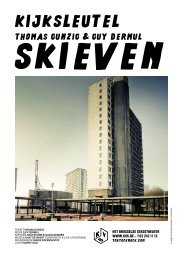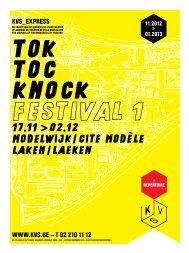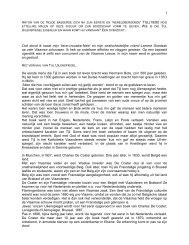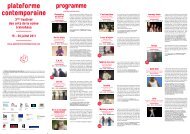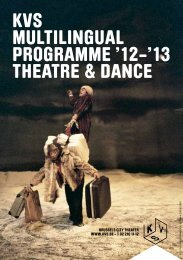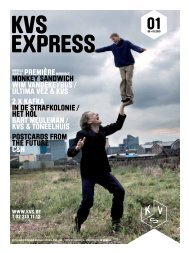februari-juni - KVS
februari-juni - KVS
februari-juni - KVS
You also want an ePaper? Increase the reach of your titles
YUMPU automatically turns print PDFs into web optimized ePapers that Google loves.
They create theatre with a grand gesture towards the<br />
smallness of man. They do it with powerful images,<br />
strong commitment and a dip into reality. Thomas<br />
Bellinck and Jeroen Vander Ven, the Steigeisen duo.<br />
‘On a sidewalk table at the Al Jazeera bar’. It was<br />
here that they met. In 2005, on the first day of their<br />
entrance exam at the RITS in Brussels. They had to<br />
wait for the jury’s decision and set off together to<br />
find a pub in Molenbeek that served draught beer.<br />
That turned out not to be so easy, so they just sat<br />
down outside the Al Jazeera. They spent the whole<br />
afternoon there, in a way that could be a metaphor<br />
for the way that Jeroen Vander Ven and Thomas<br />
Bellinck have worked together for the past several<br />
years: each half in the shade, half in the sun.<br />
Jeroen: ‘At the end of that afternoon half of Thomas’<br />
face was sunburned.’<br />
During their years at the RITS they worked together<br />
regularly. Including a performance about<br />
Robespierre, a figure they examine closely again<br />
this year in De Onkreukelbare. Jeroen: ‘Thomas<br />
was in the directing course and I was in the acting<br />
course. The more things we did together, the clearer<br />
it became that we were in a certain way compatible.<br />
We found a kind of method for working together.’ In<br />
2009 their graduation project was Fobbit, a performance<br />
based on interviews they did with Belgian<br />
troops in Afghanistan and eyewitness accounts.<br />
This performance soon made it clear to the theatre<br />
world that these two youngsters had firmly established<br />
themselves. Historical-documentary, visually<br />
powerful, masters at evoking atmosphere and<br />
the questions that matter. In 2009 they founded their<br />
own group: Steigeisen.<br />
interview / eng<br />
THE BOYS WITH<br />
THE CLIMBING-IRON<br />
inTeRVieW WiTh ThoMas beLLincK anD JeRoen VanDeR Ven oF sTeiGeisen<br />
– ANNA LuytEN<br />
steigeisen?<br />
J: ‘We were in urgent need of a name when Thomas<br />
came up with this.<br />
T: ‘Instead of looking for a name that reflects<br />
what you create, you hope that what you make will<br />
ultimately transmit itself to your name. I was browsing<br />
in Der Grosse Duden, a German picture dictionary<br />
from the thirties, when I came across the word<br />
‘Steigeisen’. It has a warm ring to it, it is a comfortable<br />
word, but ultimately it is a boot with sharp<br />
spikes. It is a climbing-iron for going up glaciers. The<br />
spelling checker always changes it into ‘steengeiten’<br />
(rock-goats)’.<br />
one of your trademarks is your particular focus<br />
on ordinary people in major events. and a fascination<br />
with political reality and how it affects ordinary<br />
people’s lives.<br />
T: ‘I want to create things that relate to the world<br />
I live in, things that anger or bewilder me. For example,<br />
De Onkreukelbare starts out from the character<br />
of Robespierre and the French Revolution, but<br />
because of the Arab Spring this performance soon<br />
acquires a double meaning. I want to say something<br />
about what is happening around me. Sometimes<br />
this manifests itself in more political action and<br />
sometimes in theatre.’<br />
J: ‘If something surprises me, I want to try and<br />
get closer to it. I do this by creating a performance<br />
about it. I want to communicate this surprise. And<br />
especially: what the ordinary person’s story actually<br />
says when it concerns a political situation in which<br />
he finds himself or for which he is a model.’<br />
billysallyJerry © kurt VanDerelst<br />
Do the two of you work together using<br />
a certain method?<br />
J: ‘Last year we made Lethal Inc., a performance<br />
based on research into ‘humane’ execution methods.<br />
It is about a camp commandant and a Holocaust denier<br />
who designs execution devices and is founded<br />
on the amazement that people can do such things.<br />
Together with the actor Joris Hessels we did the<br />
research, read and watched films together. For our<br />
other productions we talk to witnesses. We are also<br />
doing this as we prepare for De Onkreukelbare. We<br />
are reading Hannah Arendt and Zizek, but yesterday<br />
we also watched a Woody Allen film.<br />
We throw all these things onto one big pile and<br />
then start to work with them. At a certain point the<br />
roles become clear. I don’t sit waiting for instructions<br />
from Thomas, but he is ultimately the director<br />
and makes the decisions.<br />
T: ‘From a certain point Jeroen gets up on stage<br />
and I go and sit in front of it. I want to have and maintain<br />
an overview. I’m a control freak. I want to see<br />
what I am making and don’t like loose ends. Everything<br />
you see must have meaning. Sometimes I myself<br />
perform for other directors, which is good. An actor<br />
is vain and yet very vulnerable. This is something<br />
a director must always bear in mind.’<br />
that at that time everything from the sixties was<br />
actually being turned upside down’.<br />
can you also indulge your fascination for the<br />
ordinary man in the character of Robespierre, who<br />
you are now involved with?<br />
T: ‘One of the questions that really interests me<br />
here is how is it possible that a fairly ordinary figure<br />
like Robespierre could become one of the most<br />
feared figures of the revolution in such a short time.<br />
There are so many myths surrounding the man. He<br />
has so much blood on his hands. While in one of his<br />
first pieces of writing he advocates civil rights for<br />
Jews and actors, and the abolition of slavery and<br />
capital punishment. How does this change so suddenly,<br />
and why does it suddenly become so violent?<br />
This ordinariness is not a value judgment but an observation.<br />
Consequently a performance like this is<br />
also about us. How ordinary are we ourselves? We<br />
try to chase after the big events, but we ourselves<br />
are not the great thinkers and geniuses of our time.<br />
That’s the advantage of a performance: you fill it with<br />
lots of questions you cannot answer’.<br />
They are not heroes...<br />
J: ‘Heroes are not that interesting. I wonder whether<br />
they even exist. History tends to unfold more by accident<br />
than as a result of someone’s great plan.’<br />
T: ‘Sometimes you have figures like Robespierre<br />
who have an unassailable reputation. I would hardly<br />
call them heroes. We call him the ‘onkreukelbare’<br />
(the ‘unimpeachable’) because it sounds more ‘pathetic’<br />
than ‘ the incorruptible’ which is the nickname<br />
he was given during his lifetime. At the time of the<br />
French Revolution many revolutionaries lapsed into<br />
decadence following the execution of the king.<br />
They invaded the palaces and took them over.<br />
But Robespierre continued to live in a small flat in<br />
a carpenter’s house. The only thing he spent any<br />
money on was an expensive sky-blue coat he had<br />
made by the best tailor. But we would certainly not<br />
create a performance about Robespierre and ignore<br />
the world in which we live today. Besides reading<br />
and looking at more historical material, we also<br />
plan to talk to people who were directly involved in<br />
the Arab revolutions.’<br />
is this also the advantage: that in a performance<br />
What links Robespierre to the present, to the political<br />
scene in 2012?<br />
you don’t need to present firm views and slo-<br />
J: ‘A lot of questions are raised. Are there scegans,<br />
but in fact are able to treat your subject narios for a revolution? Why in God’s name do we<br />
in Billy, Sally, Jerry and the 38. gun, Willy Thomas matter tentatively?<br />
have so few examples of a revolution that has not<br />
and isabelle Van hecke also appear on stage as J: ‘Yes, very tentatively, and sometimes not taking resulted in a bloodbath? Why does revolution de-<br />
well as Jeroen.<br />
up a position is provocative in itself. We have noticed vour its own children? Hannah Arendt writes that<br />
T: ‘It was a different way of working, since I had that it knocks people off balance’.<br />
the French Revolution was a blueprint for all sub-<br />
Thomas, you appeared in the documentary series<br />
already written the script beforehand. Which does T: ‘One has an opinion, of course. During the first sequent revolutions’.<br />
Leuven Hulp as someone directing a play in pris-<br />
not mean that we don’t make all sorts of changes few weeks of the rehearsal process for Fobbit, we T: ‘In a certain sense the French Revolution began<br />
on. You worked with prisoners and psychiatric<br />
during the working process.’<br />
actually unconsciously created an anti-war pam- with grinding poverty. The Arab revolution is no dif-<br />
patients. Together with Jeroen you detonated an<br />
phlet. After a while we realised that it goes without ferent. It always starts with people who are hungry<br />
easter egg outside the ministry to focus atten-<br />
Billy, Sally, Jerry and the 38. Gun reflects on saying that we have no wish to advocate war. So we and with someone who has been sitting at a desk<br />
tion on the problem of people without papers.<br />
a september day in 1975, the day that the Us really don’t have to create a performance about this for too long and is reluctant to hand over power. Give<br />
To what extent does this concrete social engage-<br />
President Gerald Ford escaped an assassination now. We wanted to create a portrait of a man without someone a desk and a business card and strange<br />
ment define your theatre performances?<br />
attempt for the second time.<br />
going into what we thought about him. You want peo- things happen in his mind. Suddenly the question is<br />
T: ‘I’m not someone who easily walks about in<br />
T: ‘The day Sara Jane Moore pointed her gun at ple to identify or to ask a question that we also asked no longer ‘why am I sitting at this desk?’, but ‘how<br />
demonstrations holding banners. I would be very<br />
Ford. Billy is based on Oliver Sipple, the man who ourselves during the actual process itself.’<br />
can I make sure that I stay here for as long as possi-<br />
reluctant to create a performance about those who<br />
stood between Ford and Moore and reluctantly be- ‘In Billy, Sally, Jerry & the .38 Gun, Sally is simulble?’ And why is it that the people who ultimately re-<br />
have no papers because I know it would become a<br />
came a symbol of the gay movement. These are three taneously a double informer for the secret services move him from his desk themselves take his place at<br />
pamphlet. But because I personally know people<br />
lives that come together almost by chance’.<br />
and a member of extreme left-wing opposition that desk? And why can’t you get rid of them? I don’t<br />
who have no papers and the people who went on<br />
J: ‘In this performance the wonder we want to groups. She has been married several times. For a know. It’s human. Superhuman. That is what makes<br />
hunger strike, these are situations that enrage me.<br />
communicate lies in the question of how this sad time she lived as a military wife on a military base. it so frightening’.<br />
In such cases I am not averse to misusing theatre so<br />
president, this revolutionary housewife and this gay Later she married a doctor and lived in the suburbs.<br />
that these problems receive at least media atten-<br />
ex-soldier come together at that significant juncture. Then she married a Hollywood sound engineer Do you have a desk and name cards?<br />
tion. By detonating an Easter egg, for example. Or by<br />
These little people summon up a whole world’. who had been nominated for an Oscar for his work T: ‘No, Thank God.’<br />
getting the hunger-striking people without papers to<br />
T: ‘They are solitary figures who all accidentally on Citizen Kane. Later she became a member of left- J: ‘We do have a website though.’<br />
sing the Belgian national anthem in unison in three<br />
create a great historical movement which has had ist movements. All the time she effortlessly changes<br />
languages. But the aim of that kind of theatre is dif-<br />
repercussions to this very day. I do not know why, her ideological framework. A lot of her decisions<br />
ferent from what Steigeisen creates. In prison one of<br />
but our fascination for the average man apparently were driven by a feeling of loneliness. Her decision<br />
the aims was also to let people who society gener-<br />
goes very deep. In Billy, Sally... you see how spon- to point a pistol at Ford was maybe more like a desally<br />
regards as ‘scum’ be appreciated for what they<br />
taneously and coincidentally three historical moveperate attempt to be seen as a fully-fledged human<br />
did on stage. I am not a therapist. I learned a lot as a<br />
ments have come together: American imperialism being than an action based on a genuine belief in<br />
stage director in prison and in the psychiatric clinic.<br />
in the seventies, the revolutionary movements of the revolution. Yet she was the one who pulled the<br />
I enjoy working with people who have a highly sensi-<br />
that time and the reversal of the idea of freedom trigger. This tells me a lot about how history is made.<br />
tive bullshit meter. I was not there to create ‘theatri-<br />
from the sixties. Recently I read in The Seventies The same goes for Ford, who accidentally became<br />
cal nonsense’ and beat around the bush. Of course<br />
Unplugged, which is a compendium of that time, president after Nixon got into deep trouble over the<br />
a director has an ego too, and wants to come up<br />
that it is actually typical of the seventies that a Watergate scandal in 1974. He launched the Helsinki<br />
with a solution for everything. But while I was there<br />
great many ordinary people resorted to violence agreements, and later he was proud that this her-<br />
I learned not to push an actor back and forth just to<br />
in terrorist activities. We were born in 1983. There alded the fall of the Berlin Wall. He was responsible<br />
put a scene together at any cost. I’ve learned to look<br />
at an actor to see what is there and what really happens<br />
instead of seeing what I want to see. This does<br />
not go smoothly and I still find it very difficult.’<br />
are few people of our generation who can picture<br />
anything of the seventies. Usually one thinks of this<br />
time as: something like the sixties, but with more of<br />
an economic crisis. Even though you can just feel<br />
for withdrawing US troops from Vietnam. But he was<br />
never democratically elected. He always continued<br />
to struggle with an inferiority complex.’<br />
billY, sallY,<br />
jerrY…<br />
p. 03<br />
De onkreukelbare<br />
p. 20<br />
41



